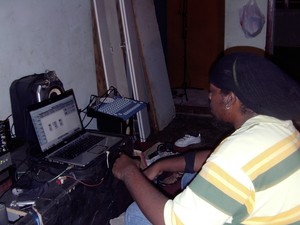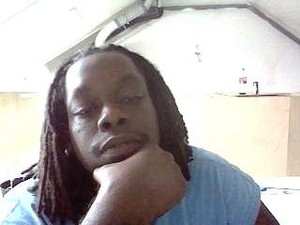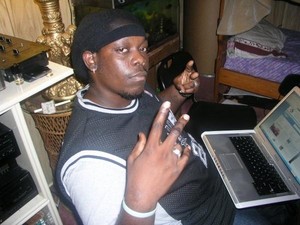Charles
Record and create MP3s from home?
Feb 26, 2011

There used to be no substitution for a nice recording job done in a professional recording studio. Now with the rising popularity of digital PC recording & the low cost of recording program, lots of people are re-thinking the idea of home recording. Plus with the ease of MP3 distribution, & the lots of sites that offer free hosting & the ability to upload & download free music, the difficulty of promoting & distributing your band as MP3s has been made simple. The questions at hand are, what do I require to start recording at home, how do I turn my recordings in to MP3s, & what do I do with said MP3s after I am done developing them?
Home recording on a PC requires a couple of things; a computer, recording program (i.e. Pro Tools, Cakewalk, Cubase), & a digital soundcard. In case you will be recording multiple tracks from multiple sources simultaneously, it is advisable to invest in a mixer as well. (This is assuming that your sound card only has one audio input) This will allow you input over one instrument/microphone to your computer simultaneously. Install your recording program & sound card drivers. Plug your mixer in to your sound card, plug your instruments in to your mixer & you are prepared to start recording. The recording routine could be a small different depending on what program you are using, but most decent program comes with a nice instruction manual which you can consult in case you are having issues. After recording, you will require to mix all tracks down to a stereo audio .wav file.
Now that our recording is done & our .wav file in hand, we all require to convert it to an MP3 file. In case you will be burning your tracks to compact disc, you wont require to convert it to an MP3 file. But for distribution for music downloads on the net, the smallest, best quality, most universally accepted format will be an MP3 file. You can take your .wav file & export it as an MP3 through whatever audio recording program you use. Most recording program offers that option, but keep in mind that you might require to mess with the output settings to get the best quality MP3 out of your program. Another option is to make use of a stand-alone .wav to MP3 converter. In case you go to download.com & search for a .wav to .mp3 converter, you will be introduced with a nice list of programs that do that. I have had nice results using both methods, so its up to you.
Once you have your MP3 files, you can set-up your own net site & offer free music downloads. Or you can go to one of the lots of sites that offer free hosting for musicians, so that the musicians will have a place to offer downloadable music MP3s, music videos, & music lyrics. Sites like, RingoTones N Music Software have other tools for musicians & engineers to use to start recording from home. Once you have your recording done, the possibilities are countless!
Share
1 comment
Like
How to Prepare for Your Recording Session
Feb 25, 2011

Some simple tips on how to make your recording session productive and smooth.
Recording is a time-intensive experience, and problems that arise often seem magnified. No one wants to wait for an hour while the guitar player runs to Guitar Center for new strings. So, to keep things going smoothly and efficiently, here are some things to do in preparation:
1. Practice! You’d be surprised how many bands come into the studio obviously unprepared. If you can’t play through the song without making mistakes, then you’re not ready to record yet. Take the time to practice the songs you want to track thoroughly. This isn’t to say that you can’t be creative in the studio, but it’s a lot cheaper to be creative on your own time.
2. Make sure your songs are finished. Going into the studio hoping to finish lyrics or parts on the spot is a recipe for dissatisfaction. You may be inspired by the pressure, but you’ll inevitably listen back to it later on and think that you could have sang it better, or that you don’t especially like this line or that phrase.
3. Record yourselves. It’s very useful to record your practice using a simple tape recorder.The finished product won’t sound very good, but you’ll be able to hear if you’re off time, or off key. It may also make you aware that some parts of your song are dragging, or that other parts could be extended or more developed.
4. Get your gear in shape. Don’t show up for a session that you’re paying for with gear that doesn’t work, cables that cut out, batteries that are going dead, or blown speakers. If you’re afraid that your gear is less than perfect, make some calls. You engineer can point you to some people in town that rent gear on a day-by-day basis, or to other musicians who might be willing to loan an amp or cabinet for a day or two. It makes a difference!
5.Tune your instrument. Drummers should put on new heads about 1 week before the session. The snare head should be replaced immediately before the session, and if you’re doing more than one or two songs, consider bringing extra snare heads. Nothing sounds as good on tape as a fresh snare head. Guitarists should put a new set of strings on a few days before the session. Bring extra strings, as you probably will break one or two. Bass players can replace their strings, although new bass strings can be a bit overly metallic. I recommend changing bass strings a week or two before the session.
6. Let people know you’re busy! You don’t want to be called in to work half-way through your session. Everyone involved needs to clear their schedules. Nothing creates more tension in a session than someone wanting to blow out early so they can hit some party. Also, if you’re recording at your home, make sure your family knows about it. Take phones off the hook, recording will require some degree of quiet. If you’re working at your practice space, make sure the neighbors know that you’ll need some quiet, if there are other bands at your facility, ask them for their schedules, and work out a time when they won’t be playing in the next room.
7. Have a plan. It’s always better to have fewer songs to finish, and to know precisely which songs you’re trying to get done. Often, once a session gets rolling, it’s easy to just go ahead and track some of the other songs you have. While this isn’t terrible, in my experience these tracks are usually discarded, as they haven’t been thoroughly practiced, and may not even be complete.
9.Develop a vision. I like to come see a band before I record them, just to get a feel for their sound, and develop my vision for the session. If you envision your record sounding like the latest MTV hit, you may be frustrated and disappointed. Your band is unique, and my goal as an is to find what’s best about your band and accent that. Your record may not sound like anything that’s come before, and try
Share
Post comment
Like
Benefits Of Music - Use The Title Actually 'Intelligence
Feb 25, 2011

It is widely known that the origins of music return at least 50,000 years. Music seems to be ingrained in our genetics and tunes are rhythms that are integral to our lives.
Music has been a part of existence since time immemorial. And, it is in every single place in the rhythms of nature, the chatter of animals and birds, the babbling of children, and in the dancing of brooks. Listen and you will listen to sweet tunes all weaving a magic of their own.
Music seems to play many roles in our lives:
Research indicates the infants who learn music are more likely to become doctors, engineers, and computer professionals. Music learning develops areas of the brain responsible for language as well as reasoning. Music is known to sharpen memory. A Rockefeller Foundation study reveals that those who studied music have SAT scores of 427.
If a kid in the womb of its sister listens to music it is born with highly developed intelligence.
The therapeutic values of music are well documented. It heals people with mental problems, developmental and learning disabilities, Alzheimers disease, brain trauma, and hypertension. That music heals has been recorded in the works of Aristotle and Plato and in the centuries that followed.
Music molds people it teaches coordination, teamwork, discipline, and self-expression.
Infants who grow up in a music filled surroundings are happy, fulfilled, and joyous.
That plants reply to music is reality not a myth. Plants are known to prosper with music and also move towards the sound.
When music is played in hospital waiting rooms and so on it ebbs tensions and calms the mind.
Music takes the devout closer to god and in religion congregational singing has always worked. Singing hymns lifts any heaviness from the mind and frees the soul.
Music has meditative properties and can be used for healing, exercising, and training modules.
When music plays, people function better. Many find that they enjoy work or activities like cooking and cleaning when music is playing. It erases tensions and lifts weights off the shoulder. Music actually introduces lightness into the body.
Music reflects the culture of a society and strengthens bonds. It creates a camaraderie and oneness as seen in footy matches, military training, and festivals.
Romance and love would not have so many hues but for music. Music and song have captured feelings, passions, agony, distress, and more succinctly. Through song many a romance have been immortalized. Mating calls and songs are universal in nature.
Scientists are using music to map behaviors and unravel the many mysteries of the human mind and consciousness.
Music settles down rage and resentment quickly and also helps us overcome feelings of sorrow and loss. It lifts the mind and spirit out of despair and gives hope. From centuries ago a sister has always sung lullabies to her fussing kid lulling it to sleep with softly whispered songs.
Did you know that while classical music soothes and opens up channels in the mind, rock music can set pulses racing, and chants can send you into a trance. Music used differently has varied effects on human beings. Music can be a panacea or hell depends on the way it is used.
Music has other makes use of it can raise levels of excitement and cause frenzy. It is used to call armies to war by the beating of drums, to instigate raw emotions in the coursework of revolts, and to drum up frenzy at footy matches and rock shows.
Share
Post comment
Like